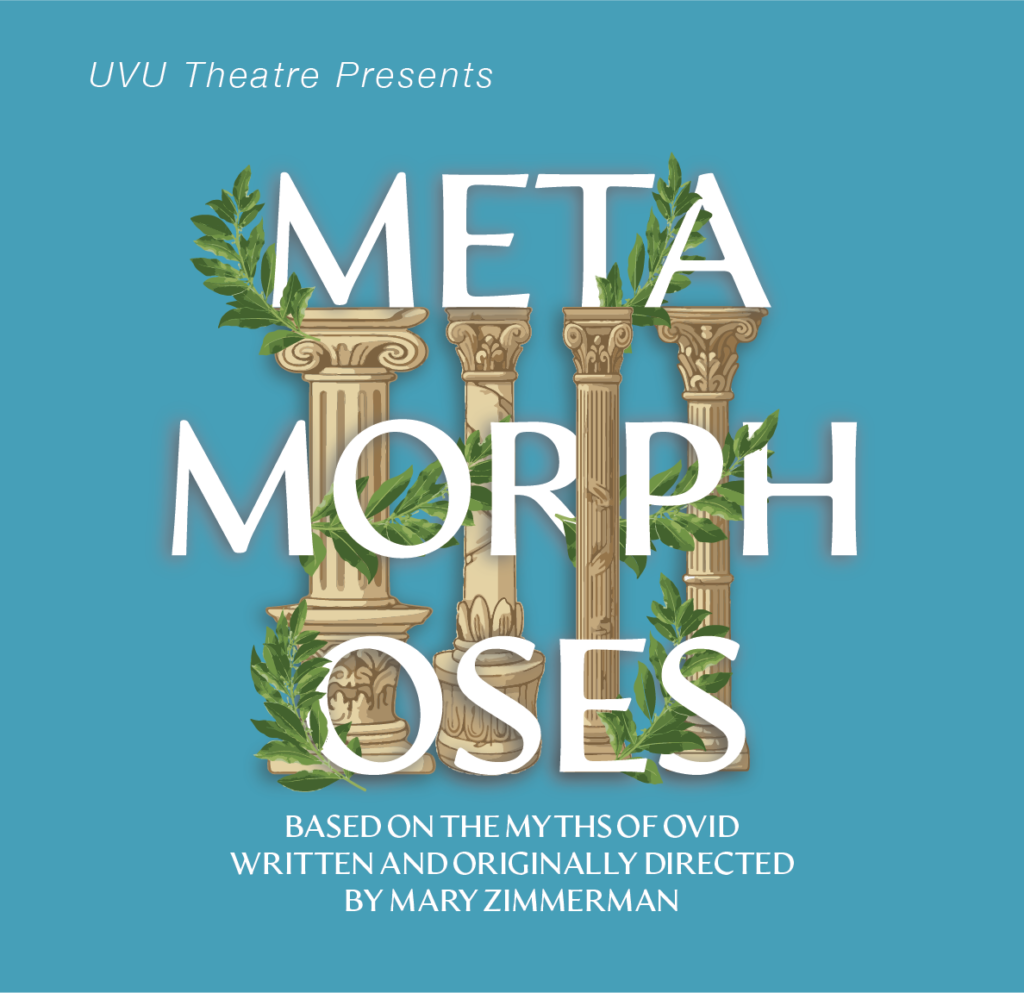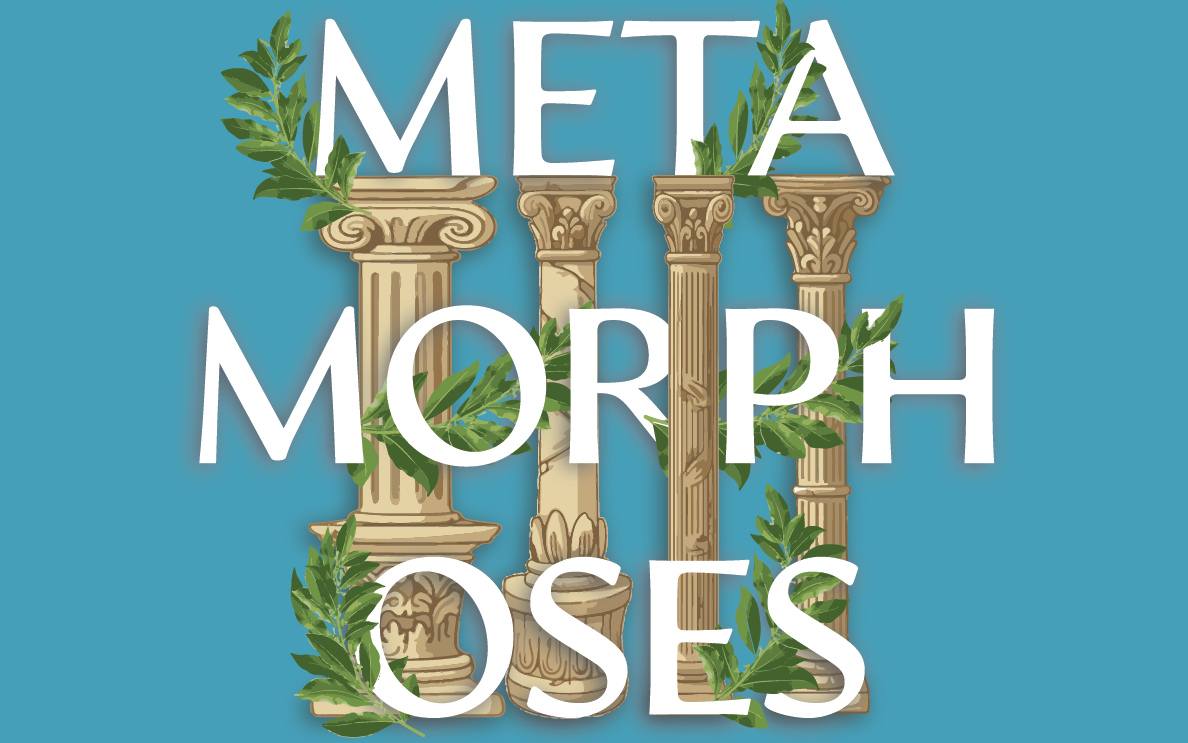OREM — Utah Valley University’s production of Ovid’s Metamorphoses is the type of theatre that can be lifechanging. Walking into the black box Melanie Laycock Bastian Theatre, the audience is met by light fog, faint bird sounds, and a set that is quite simple—except for the pool. Yes, there is a pool of water in the center of the stage. It is painted black inside, so you can’t see the bottom nor discern its depth. Playwright Mary Zimmerman’s staging notes state that the “stage is entirely occupied by a square or rectangular pool of water.” While UVU’s modestly sized, shallow pool doesn’t entirely occupy the space (and no one will be fully submerged in it, unlike some big budget productions), the production uses the pool very effectively, integrating the water fully into the production as Zimmerman intended.
Directed by faculty member Steven Rimke, Metamorphoses is a collection of 10 Greek myths that relate to transformation or change, hence the title, Metamorphoses (plural). Water plays a symbolic and literal part in each story of transformation, as it so often does in life transformations such as birth and cleansing. Metamorphoses weaves together these stories, sometimes humorous, sometimes tragic, sometimes both, of the humans and the divine, and our capacity for change. Rimke’s director’s note also makes timely reference to societal transformation in America which another layer to contemplate.
The online study guide from UVU is a trove of information from dramaturg Bethany Brynne Lamb, a senior in the Theatre Education program. This guide is a fantastic element that non-educational theatre companies should provide, too. It not only walks audience members through the Greek pantheon and world of mythology, it gives a history of societal change in America, and queries the cast about their own transformational journey with the text. Outside the theatre, audience members are invited to write their own thoughts related to the production on large boards—which invites the audience to connect more deeply with the production.
Metamorphoses is an excellent choice for a student production, and a credit to the work of the UVU faculty. Ensemble pieces like this offer challenging roles to many students (with no small parts), instruct in the art of storytelling and teamwork, and hone students’ ability to move in and out of character quickly and fluidly. It is a master class in ensemble work.
Staging by Rimke and assistant director/student Katilin Beau is lovely and tender, with great use of the space and of the water. Moments when the water seems to tear apart lovers Orpheus and Eurydice, or pull Cupid and Psyche together, or cleanse Midas from his curse, are compelling and visually striking. The only time the water is problematic and distracts is when it causes a slip hazard for the cast. Despite cleverly working frequent drying of the stage into the blocking, there were still two slip-and-fall moments on opening night, which the cast handled with grace, and can hopefully be prevented as the run progresses. Rimke blocks some interactions with characters facing and speaking upstage, away from the audience, often speaking to a god on an elevated platform at the back of the stage. This is used to great effect most of the time, although occasionally greater projection is needed from the cast, especially at these moments, so the audience doesn’t lose the language. Rimke and Beau have a clear aptitude for pacing, taking great care at times to slow down at the right moments, and push forward at others, and in using silence effectively to amplify a particular moment.

Movement by dance student Luciano Schroeder is captivating, bordering on magical. The first Orpheus and Eurydice scene, for example, repeats many times with slight changes in the movement and context; each time is stunning and it is perhaps my favorite scene visually. The physical movement Schoreder and actor Taytum Ligman infuse into the character of Hunger is savage and voracious. Ligman’s full embodiment of hunger consumes her victim, Erysichthon, played by Liam Owen, creating a breathtaking duet of movement. Just watching Ligman clamor across the stage created knots in my own gut, drawing me further into the story.
The acting is superb. Although it is apparent at times that these are students, still learning and honing their craft, it is easy to forget that fact, as the ensemble is adept. Tyler McCabe showcases his comedic ability as Vertumnus and Phaeton. Sasha Wilkinson is heartbreaking as Eurydice, and surprisingly captivating in the relatively small part of Q in the Cupid and Psyche scene. Hyrum Housely’s hilarious but brief performance as Sleep brought the house down.
Costuming by student Kaely Hope is lovely—simple, neutrals for the narrators that echo the drape of classical Greek and Roman dress, while bolder pieces are added and removed for specific characters. However, there are a lot of quick wig and costume changes that I feel could have been simplified. One of the better transformations is when Maura Monson as Psyche steps out of her wig and dress on stage, handing them to Cupid as she moves seamlessly into the next scene and character. Bringing more costume and wig changes onto the stage may have a greater impact.
Lighting by co-designers and students Carly Short and Danielle Tanner is well done—fog hangs in the air throughout the production to set mood. The purple/pink hues for Cupid’s entrance that are pushed to blue as Psyche enters his space is mesmerizing, the water casting blue reflection on the back curtains to great effect. The scenic design by Janice Chan was sufficient with an interesting use of every day objects incorporated into the simple design as a reminder that we are all storytellers within our own lives, emphasizing the idea spoken by one of the characters that “myths are a public dreams and dreams are private myths.”
Metamorphoses isn’t for everyone—content warnings state that it is for mature audiences as it tackles concepts such as violence, self-harm and incest. Though parental and personal discretion is advised on these points, I didn’t find the production to be particularly provocative or disturbing and would suggest that it is appropriate for thoughtful teenagers and adults. Overall, UVU’s production is visually rich and exquisitely staged. It is the kind of thoughtful, transformative theatre that I think we need more of, and might get overlooked in the comparative noise of sparkly but overdone productions in the area. The biggest downside to the production is its short run. Metamorphoses is a beautiful and unusual production that will leave you with something to think about for some time to come.
[box]Metamorphoses plays Tuesday through Saturday at 7:30 PM through November 23, in the Melanie Laycock Bastian Theatre at the Noorda Center for the Performing Arts (800 W University Parkway, Orem). Tickets are $20. For more information, visit uvunoorda.universitytickets.com[/box]
